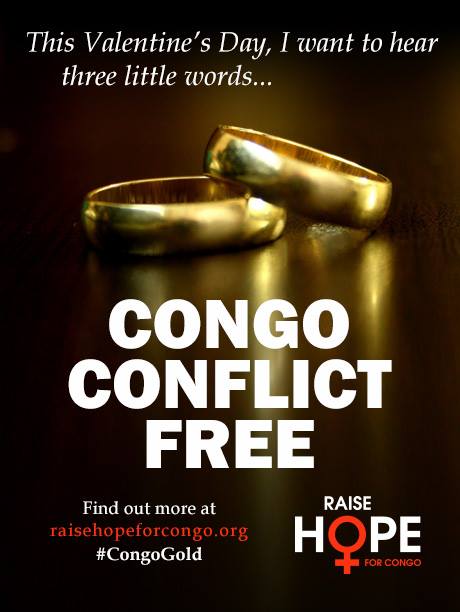
This op-ed was originally published by the Huffington Post and written by Emmanuelle Chriqui (@echriqui) an actress and advocate for the Enough Project's Raise Hope for Congo campaign and JD Stier (@JDStier) is Manager of the Raise Hope for Congo campaign (@RaiseHope4Congo).
Here we are again, that time of year where love is officially celebrated between family, friends, lovers, crushes and colleagues. Valentine's Day. Honestly, we both look forward to this holiday. What's not to love?
We're sentimental. We long for time with family and cherish every moment in their company. We love time with friends and savor every memory. We believe in true love. The romantic, all-or-nothing, "'til death" kind of love. We express it with gifts of flowers, cards, candy, chocolate and gold–beautiful, delicate gold–especially on Valentine's Day. Valentine's Day is the holiday for love, but the gold so many people give each other as a symbol of their love may be fueling violent conflict in the Democratic Republic of Congo. The silver lining: we can do quite a bit as consumers to help our jewelry companies address conflict gold.
The Facts: Much of the gold mined in the eastern part of the Democratic Republic of Congo benefits armed groups guilty of committing mass atrocities including rape and torture. The jewelry industry is the largest purchaser of gold worldwide, accounting for roughly half of global demand for gold. Jewelers purchase gold from numerous suppliers along a murky supply chain, and most cannot say where the gold originates or whether it fueled armed violence. Click here to see how gold travels from child miners to jewelry companies.
The Call: This Valentine's Day, we are calling on the world's leading jewelers to shine a light on their supply chains and join a growing movement to establish conflict-free gold mines and trading routes in Congo. When activists demanded an end to blood diamonds from war-affected Sierra Leone, Liberia, and Angola, jewelers responded. They can and must use their leverage again to support peace in Congo.
You can read the full op-ed on Huffington Post.

